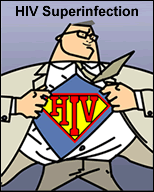By
Liz Highleyman
 Over
the course of the AIDS epidemic public officials have cautioned
that HIV positive people
should avoid unprotected sex with each other in order to prevent
"superinfection," or infection with additional viral
strains that could potentially be more aggressive or drug-resistant.
Some advocates, however, promote "serosorting" as
a responsible risk-reduction strategy for HIV positive gay
men.
Over
the course of the AIDS epidemic public officials have cautioned
that HIV positive people
should avoid unprotected sex with each other in order to prevent
"superinfection," or infection with additional viral
strains that could potentially be more aggressive or drug-resistant.
Some advocates, however, promote "serosorting" as
a responsible risk-reduction strategy for HIV positive gay
men.
Several
prior studies have failed to find evidence of superinfection,
or indicate that it happens only rarely -- around 50 cases
total -- typically during the early years after infection
with the initial virus.
As
described in the June
2011 Journal of Infectious Diseases, Andrea Rachinger
from the University of Amsterdam and colleagues looked for
evidence of superinfection over time among participants in
the Amsterdam Cohort Studies on HIV Infection and AIDS.
The
researchers analyzed HIV-1 C2-C4 envelope (env) and gag sequences
generated from longitudinal blood samples from 15 gay/bisexual
men who had not yet started antiretroviral therapy. Serum
samples had been collected around the time of self-reported
risk for HIV sexual transmission, including unprotected anal
sex or having other sexually transmitted infections.
The
study authors used maximum likelihood phylogenetic analysis
to detect evidence of new HIV strains in a total of 124 serum
samples. They looked at a median of 8 samples per participant
with a median follow-up period of 5.8 person-years, or about
88 total person-years.
Phylogenetic
analysis of a total of 907 C2-C4 env sequences and 672 gag
sequences revealed no case of HIV superinfection, yielding
a superinfection incidence rate of 0 per 100 person-years.
Based
on these findings, the authors wrote, "We conclude that
HIV-1 superinfection incidence is low in this subgroup of
homosexual men who reported unsafe sexual behavior."
However,
they suggested, "Additional studies are required to estimate
the impact of also other factors, which may determine the
risk to acquire HIV-1 superinfection."
 Investigator
affiliations: Department of Experimental Immunology, Sanquin
Research, Landsteiner Laboratory, and Center for Infection
and Immunity Amsterdam (CINIMA) at the Academic Medical Center
of the University of Amsterdam; Cluster of Infectious Diseases,
Department of Research, Health Service of Amsterdam; Department
of Internal Medicine, CINIMA, Academic Medical Center of the
University of Amsterdam, Amsterdam, Netherlands.
Investigator
affiliations: Department of Experimental Immunology, Sanquin
Research, Landsteiner Laboratory, and Center for Infection
and Immunity Amsterdam (CINIMA) at the Academic Medical Center
of the University of Amsterdam; Cluster of Infectious Diseases,
Department of Research, Health Service of Amsterdam; Department
of Internal Medicine, CINIMA, Academic Medical Center of the
University of Amsterdam, Amsterdam, Netherlands.
6/7/11
Reference
A
Rachinger, P Manyenga, JA Burger, et al. Low Incidence of
HIV-1 Superinfection Even After Episodes of Unsafe Sexual
Behavior of Homosexual Men in the Amsterdam Cohort Studies
on HIV Infection and AIDS. Journal of Infectious Diseases
203(11):1621-1628 (abstract).
June 2011.
